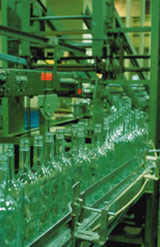Groundwater Basics
The natural quality of groundwater

Bottling spring water
One of the great benefits of using groundwater is that it is normally of good quality. The slow infiltration of water through soil and rocks act as a natural filtration process, removing many potential contaminants, especially harmful bacteria.
As water passes through rocks natural reactions occur between the minerals in the rocks and the water, so the water chemistry changes. These changes impart unique flavours to groundwater – in moderation it is these flavours that make bottled mineral water popular, and provide trace amounts of minerals that are important to our health. These reactions also give rise to ‘hardness’, which occurs when water passes through rocks like limestone or chalk that are rich in natural carbonates.
Groundwater that has been in contact with rocks over long periods may have very high concentrations of dissolved minerals. Water will eventually become saline and unsuitable for use as drinking water or irrigation supplies. Under some geological conditions, groundwater can contain dangerous concentrations of dissolved constituents like arsenic and fluoride. Excessive intake of floride can cause teeth mottling and brittle bones. However, at lower concentration (less than 1.5 microgrammes per litre) it can be beneficial, helping to reduce tooth decay.
Natural groundwater quality problems can be dealt with by blending water from multiple sources or by treating the water before it is used.

Print this Page